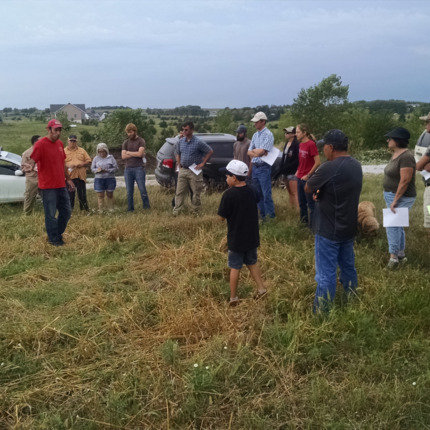Para la versión en español, oprima aquí.
This was published in Mundo Latino Network's newspaper on September 22, 2023.
From the desert of New Mexico to the fields of Nebraska, Justin Jones has been intrigued by the land around him since he was a child, and he continues to learn from it to this day.
Twenty-three years ago, Justin moved from New Mexico to Nebraska to pursue opportunities as a professional musician. He ended up staying in the area and not only continued his music career but cultivated a relationship with the land when he started farming near Crete.
“Growing stuff in the desert was a project; there were no large-scale agriculture opportunities there,” said Justin. “I grew up falling in love with land, so growing food is an attempt to make land management a bit of a way to get outside and work with the land.”
Justin founded Jones EcoFarms (formerly Jones Produce) in 2010 in the hills east of Crete. Initially, the farm focused on produce, then expanded to include livestock and perennial plant production.
Jones EcoFarms spans 20 acres, with 3.5 acres set aside to grow produce and the rest pasture. Justin mainly grows asparagus because it makes sense ecologically.
“Take the perspective of crops being the first wave; nature doesn’t really want to do annuals,” he said. “A lot of the work and expense in agriculture involves resetting the land into annuals. That’s a lot more work when you have another job outside of farming. Perennials utilize animals, and they offer a more hands-off approach. Growing asparagus works better for me and how I want to work. It's also a market niche; there are only so many radishes you can sell.”
Justin also pastures custom-grazed cattle, then ships them out in the fall. He generally brings in someone else's cattle in the summer, although this year he hasn’t because of the drought.
Justin and his wife own an event venue in Crete for weddings and other celebrations, and he is also part owner of Lincoln-based Lone Tree Foods, a full-service local and specialty foods distributor featuring food from more than 50 farms, artisans, and grocery brands from Nebraska and the surrounding area.
Along with working on the business and production side of food, Justin partners with the Center for Rural Affairs from time to time on farm tours or workshops.
“I work with a lot of the Center staff on local food scene projects, and I pay close attention to the Center’s work,” he said.
The Center often works with beginning farmers, and Justin has helped with that over the past several years.
“When it comes to beginning farmers, there are people who come to it from more of an urban, affluent side of things,” Justin said. “For those folks it’s maybe more of a dream or passion project. The Center, on the other hand, works with Latino constituents, and, in some cases, small farming might be more of a difference maker in their lives.”
Growing up in New Mexico, Justin had a lot of involvement in and enjoyed learning from Latino communities, and he continues to work with and support several Latino communities around Crete.
Recently, the Center worked with Justin to host “Benefits of a Diversified Farm,” a Spanish-speaking Facebook live presentation at his farm. His hope for events like this is to provide small-scale and beginning farmers a variety of examples or points of reference for ideas, inspiration, and a chance to incorporate trial and error efforts.
Justin enjoys being a mentor for local Latino growers and aspiring farmers, as there aren’t many other bilingual or language-accessible education opportunities in the area.
“At Lone Tree Foods, we aren’t necessarily seeking farms to collaboratively partner with right now, but we encourage farmers to find others to partner with,” he said. “Working together with other growers, having support in that sense, whether formal or informal, works a lot better than working on one's own. When you’re on a certain scale of smaller farming, it forces people to get big, but you don’t have to get big on your own. Collaborate to make it.”
As for Jones EcoFarms, Justin has things planned out well into the future, including incorporating more fruit production as part of his perennial crops and enjoying Nebraska’s land for years to come.
“Asparagus only has a lifespan of 10 to 15 years,” he said. “I want to try fruit after that to keep up the ecological succession. The next phase includes apples and native berries like elderberries to see what grows and establish what works. After coming to Nebraska, I discovered I have a long family history here I wasn't aware of. It's been kind of full circle for me and I’m genetically comfortable here.”





